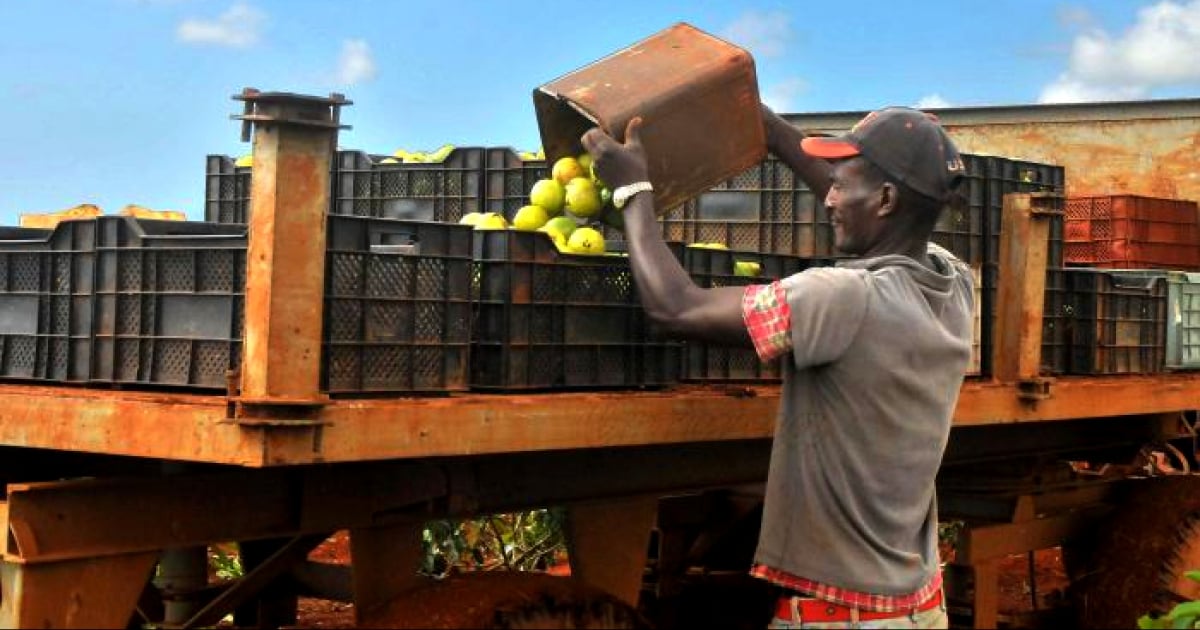The state-owned Collection Agency of Cienfuegos owes more than five million pesos to agricultural producers in that province, as reported this Friday by the National Television News (NTV). The report, which focused on the government's visit aimed at "correcting distortions and boosting the economy," briefly mentioned the "non-payment of five million pesos to farmers" during a speech by Prime Minister Manuel Marrero Cruz.
The news report failed to identify those responsible for the non-payment, provide reasons for the debt, or specify when the delays will be resolved. The reporter quickly moved on to mention other issues affecting farmers, such as the increase in theft and slaughter, which contributes to a decline in livestock numbers.
State debts to Cuban farmers stretch back several years. Farmers face mistreatment in the form of unpaid dues, mandatory delivery quotas, payments below production costs, lost harvests due to lack of transportation, and difficulties in purchasing fuel, tools, machinery, fertilizers, or seeds.
Affected farmers complain about the impossibility of increasing their production and yields, the unsustainable conditions for working the land, and the deterioration of their living conditions. In February 2020, the non-governmental organization Cuban Economic Rights Observatory estimated the state's debt to private farmers to be in the billions of pesos.
In June 2020, the ruler Miguel Díaz-Canel announced that his administration was designing a policy to locally market agricultural products. "I keep saying that Acopio cannot be the only mechanism; we need to create other structures," Díaz-Canel explained in a videoconference with governors from all provinces.
Challenges Facing Cuban Agriculture
Four years later, Cuban agriculture remains largely subject to the whims of the policies set by the leader appointed by General Raúl Castro. From the infamous and ineffective "63 measures to increase food production in the country" to the dysfunctional planned socialist economy and its network of state-owned companies like Acopio.
In January 2022, it was reported that Acopio of Ciego de Ávila ended the month with over 100 million pesos in debt, 35 million of which were unpaid to farmers. Complaints from these farmers highlighted inefficiencies ranging from non-payment to tons of food rotting due to lack of transportation.
A year later, the Minister of Agriculture replaced the president of the Collection Group, Nelson Concepción de la Cruz, stating that he had "fulfilled giant missions." The Minister, Ydael Pérez Brito, posted on social media, "A cycle ends, and another begins, closing the process of handing over the position of President of Acopio (...) calling for a new awakening of state functions and thanking those who have fulfilled giant missions in this tough battle to balance state and private functions for the benefit of the Cuban people."
In 2021, the Ministry of Agriculture (MINAGRI) called for "definitively resolving the issue of non-payment to agricultural producers to ensure greater incentives and avoid financial imbalances. Forms of marketing that cannot solve this problem should disappear," recalled a Cuban farmer.
Leonel Capote denounced that the state-owned Acopio continued to owe a substantial debt to producers in the Artemisa province in western Cuba. Among those affected, Capote mentioned his cooperative, which was owed eight million pesos by the Agricultural Company.
What Are Collection Centers?
The Cuban Conflict Observatory (OCC) explained in May 2020 that "all farmers in Cuba are required to deliver their harvested products to those state centers, which pay them a pittance, store the goods, and then distribute them gradually as they can."
"This absurd centralizing system comprises a bureaucratic-commercial-interventionist state machinery subordinated to the Council of Ministers, but effectively directed by the Communist Party in each province and municipality. It consists of 13 Acopio companies with various facilities across the island. Acopio arbitrarily sets the low prices paid to farmers for their products," the NGO explained.
According to the OCC, "One of the most serious consequences of the Acopio system is that it pays very little for its products to farmers and land usufructuaries, who number more than 420,000 and generate almost 90% of the country's agricultural products."
"This is a strong disincentive to produce more with better quality. If private farmers could sell their products directly at market-set prices, there would be more food in Cuba," the experts at the Observatory evaluated.
The OCC highlighted that "it is well known that each year thousands of tons of agricultural products from the basic Cuban diet rot in Acopio warehouses because there are not enough trucks, or they are broken down."
"Moreover, the entire technical and operational infrastructure of Acopio is generally obsolete and insufficient to receive and distribute fresh food nationwide, which the population desperately needs," the NGO concluded in its study, where it denounced that the Collection Centers were exacerbating hunger in Cuba.
Understanding the Issues with Cuba's Collection Agency
Here are some frequently asked questions and answers regarding the issues surrounding Cuba's state-run Collection Agency and its impact on farmers.
Why does the state-owned Collection Agency owe money to farmers?
The debts are due to various inefficiencies, including mismanagement, lack of funds, and logistical challenges, which have resulted in delayed payments to farmers.
What are the consequences of these debts for farmers?
Farmers face significant challenges, including the inability to increase production, unsustainable working conditions, and deteriorating living standards.
What solutions have been proposed to address these issues?
Proposals include creating alternative structures to Acopio, allowing private farmers to sell directly at market prices, and improving management and logistics within the Collection Agency.
